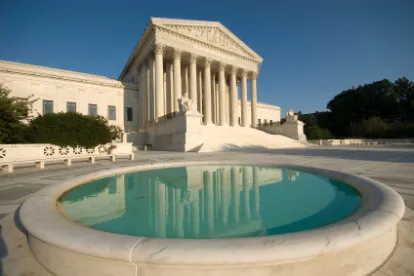On May 30, 2017, the U.S. Supreme Court held in Impression Products, Inc. v. Lexmark International, Inc. that “patent exhaustion is uniform and automatic” and that patent exhaustion applies, both domestically (in an 8-0 decision) and internationally (in a 7-1 decision), upon the first authorized sale of a patented product. However, the Court made clear that post-sale restrictions, both domestically and internationally, may be enforced through contract law. This decision marks another reversal by the Supreme Court of the Federal Circuit and further limits the ability of patent holders to control the use of a patented product once sold.
Background
Lexmark sued Impression Products for patent infringement regarding Impression Products’ remanufacture and sale of Lexmark printer cartridges. Some of the cartridges were originally sold by Lexmark to customers domestically at a discount under a single-use/no-resale agreement. Other cartridges were originally sold to customers outside the U.S. by Lexmark, but then imported back into the U.S. by Impression Products in remanufactured form.
Impression Products filed a motion to dismiss, relying on patent exhaustion. The district court granted the motion to dismiss as to the domestic Return Program cartridges, but denied the motion to dismiss as to the cartridges Lexmark originally sold abroad. The Federal Circuit, en banc, ruled for Lexmark with respect to both sets of cartridges. For the domestic cartridges, the Federal Circuit relied on its decision in Mallinckrodt, Inc. v. Medipart, Inc., 976 F.2d 700 (Fed. Cir. 1992), holding that a patentee may sell an item and retain the right to enforce, through patent infringement lawsuits, “clearly communicated, … lawful restriction[s] as to post-sale use or resale.” For the cartridges sold abroad, the Federal Circuit relied on its decision in Jazz Photo Corp. v. International Trade Commission, 264 F.3d 1094 (Fed. Cir. 2001), holding that a patentee’s decision to sell a product abroad does not terminate its ability to sue a buyer for patent infringement that imported the article and sold it in the United States.
First Authorized Domestic Sale Exhausts All U.S. Patent Rights
Citing its precedent spanning over 160 years, from Bloomer v. McQuewan, 14 How. 539 (1853) to Quanta Computer, Inc. v. LG Electronics, Inc., 553 U.S. 617 (1998), the Supreme Court explained that the “well-established exhaustion rule marks the point where patent rights yield to the common law principle against restraints on alienation.” The Court then held that this “well-settled line of precedent allows for only one answer [to the issue of domestic patent exhaustion]: Lexmark cannot bring a patent infringement suit against Impression Products to enforce the single-use/no-resale provision accompanying its Return Program cartridges. Once sold, the Return Program cartridges passed outside of the patent monopoly, and whatever rights Lexmark retained are a matter of the contracts with its purchasers, not the patent law.”
The Court also noted that the en banc Federal Circuit decision to the contrary “got off on the wrong foot” on this issue, as “the exhaustion doctrine is not a presumption about the authority that comes along with a sale; it is instead a limit on the scope of the patentee’s rights” [internal quotation omitted; emphasis in original]. Additionally, while the Federal Circuit expressed concern in its decision that preventing patentees from reserving patent rights when they sell goods would create an artificial distinction between such sales and sales by licensees, the Supreme Court explained that “[a] patentee’s authority to limit licensees does not … mean that patentees can use licenses to impose post-sale restrictions on purchasers that are enforceable through the patent laws. So long as a licensee complies with the license when selling an item, the patentee has, in effect, authorized the sale” [emphasis in original].
International Patent Exhaustion Not Treated Differently Than Domestic Patent Exhaustion
In holding that “[a]n authorized sale outside the United States, just as one within the United States, exhausts all rights under the Patent Act,” the Court heavily relied on its decision in Kirtsaeng v. John Wiley & Sons, Inc., 568 U.S. 519 (2013), which held that the “first sale” rule in copyright law applies to copies of a copyrighted work lawfully made and sold abroad. The Court explained that “[a]pplying patent exhaustion to foreign sales is just as straightforward” as it is in the copyright context and “differentiating the patent exhaustion and copyright first sale doctrines would make little theoretical or practical sense.” The Court’s ruling thus also signifies a trend in its uniform treatment of intellectual property rights regardless of the statute in question, as the Court made a similar analysis in SCA Hygiene Products when determining that laches did not bar a patent suit brought within the limitations period akin to its earlier ruling in the Raging Bull copyright laches case (Petrella v. MGM).
In the instant case, Lexmark argued that foreign sales should not exhaust U.S. patent rights, as patentees in foreign markets may not be able to sell their products for the same price that they could in the United States and, therefore, patentees selling in foreign markets are not sure to reap the economic benefits provided under U.S. patent law. The Court dismissed this economic concern, stating that exhaustion “does not depend on the patentee receiving some undefined premium for selling the right to access the American market” and “the Patent Act does not guarantee a particular price, much less the price from selling to American consumers.”
The Court also rejected the position taken by the United States in its amicus brief that a foreign sale authorized by the U.S. patentee should exhaust U.S. patent rights unless those rights are expressly reserved. The Court explained that this position “wrongly focuses on the likely expectations of the patentee and purchaser during a sale … [e]xhaustion does not arise because of the parties’ expectations about how sales transfer patent rights … [i]nstead, exhaustion occurs because, in a sale, the patentee elects to give up title to an item in exchange for payment.”
Breach of Contract Claim Still Available to Enforce Post-Sale Restrictions
Throughout its decision, the Court made clear that post-sale restrictions in both the domestic and international context could be enforced through contract law. For example, the Court explained that “[a] patentee is free to set the price and negotiate contracts with purchasers” and held that “whatever rights Lexmark retained [as part of its single-use/no-resale provisions for its Return Program cartridges] are a matter of the contracts with its purchasers, not the patent law.” The Court also stated that disputes between the patentee and purchaser of a product, regarding expectations associated with an international sale, “can be addressed through contract law,” as opposed to a patent infringement claim.
Justice Ginsburg’s Dissent
Justice Ginsburg concurred in the Court’s holding regarding domestic patent exhaustion but dissented on the international exhaustion issue, explaining that “[b]ecause a sale abroad operates independently of the U.S. patent system, it makes little sense to say that such a sale exhausts an inventor’s U.S. patent rights.” This dissent is not surprising, as Justice Ginsburg also dissented from the Court’s Kirtsaeng decision in 2013.
Next Steps
The Supreme Court has now made clear that enforcement of post-sale restrictions on patented products (either domestic or international) cannot be made under patent law and, instead, may be made under contract law. In the wake of this decision, patent owners will need to think more carefully about the types of restrictions to place on licensees or customers. Additionally, the Supreme Court’s decision could result in many of these types of disputes being handled in either state courts or other federal courts of appeal (besides the Federal Circuit) where such disputes are grounded in contract law.




 />i
/>i
